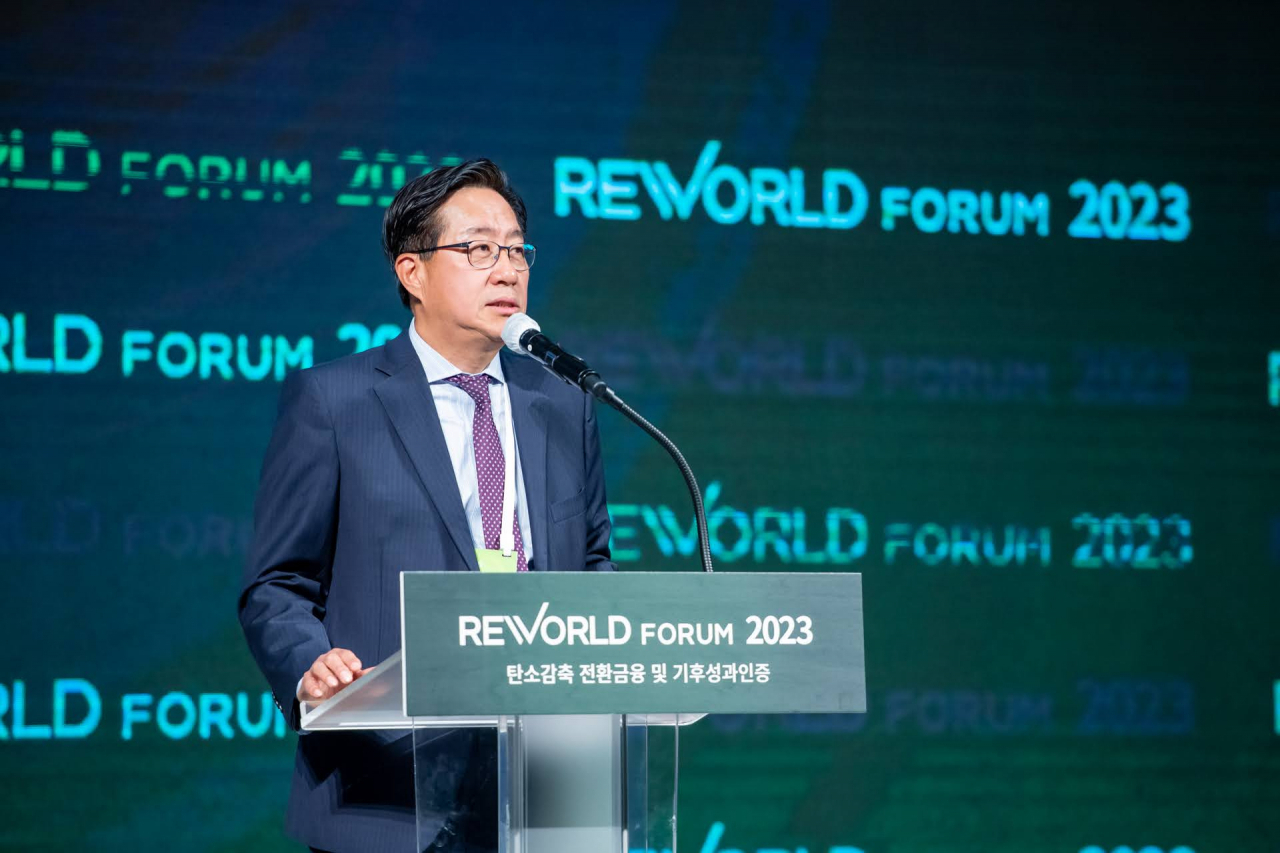 |
SDX Foundation Chairman Jhun Ha-jin talks during ReWord Forum held in Seoul on Wednesday (SDX Foundation) |
The SDX Foundation chairman warned that innovative changes to our old perception of the climate crisis must occur within the next 10 years, or it will be impossible to prevent catastrophic consequences.
“Although our generation only worked hard for our family and society, the outcome has unfortunately led to passing on a deteriorated environment to our children,” said SDX Foundation Chairman Jhun Ha-jin, 65, during a ReWorld Forum in Seoul on Wednesday.
“Due to this unfortunate outcome, our children may resent our generation. If we do not solve this problem soon, we will become criminals in our history."
The SDX Foundation, a nonprofit seeking sustainable growth based on digital transformation, organized this forum on Wednesday under the themes of net-zero transition with over 300 participants, including government officials, financial and corporate professionals and academics. The forum included various presentations, panel discussions as well as networking sessions.
The forum especially focused on exploring “transition finance,” which refers to offering financial services to high carbon-emitting industries to fund their transition to decarbonization.
Choi Jung-kiu, a managing director and partner at Boston Consulting Group, Singapore, explained that Korean banks that can develop an effective transition finance model will have the opportunity to expand their business overseas.
“When analyzing the loan portfolios of local banks, around 36 percent of their loans are concentrated in industries with high carbon emissions,” Choi said. “If Korean financial institutions can create experimental transition finance models, they could become recognized as globally competitive."
Kim Sang-hyup, head of the 2050 Carbon Neutrality and Green Growth Commission, emphasized why it is important for the financial industry to make changes during the conference.
Kim said that an estimated $68 trillion of global finance will be mobilized for low-carbon transitions by 2030, with $37 trillion focused in Asia.
“The finance sector, which is closely linked to various industries and technologies, must become the driving force behind achieving net-zero emissions,” he said.
He also said it is crucial for the government to implement a "Korean-style Inflation Reduction Act" that regulates local industries, but also provides incentives at the same time.
“The (Korean) government has presented an ambitious goal of reducing greenhouse gases by 40 percent. Considering Korea's energy-intensive industrial structure, innovation is necessary," he added.
Several high-profile figures--including Won Hee-ryong, Minister of Land, Infrastructure and Transport, and Ban Ki-moon, former Secretary-General of the United Nations and chairman of the presidential committee on carbon neutrality and green growth-- participated in the event through brief video messages.
Won noted in his video that there is a growing global consensus toward carbon neutrality.
"At the center of these changes is the financial industry,” Won said.
Ban also emphasized the role of financial institutions in carbon reduction.
“Korean banks are making various efforts such as creating environmental, social and corporate governance funds, which can be a key factor in promoting ESG management of companies. Through such efforts, we should work toward overcoming the climate crisis and create a sustainable green future.”
South Korea's Environment Minister Han Wha-jin also said “Korea must now transition its entire economy and society toward a low-carbon structure, based on plan for carbon neutrality and green growth. Such a transformation will involve substantial expenses, making it crucial to expand private investment alongside direct government financial input.”
Launched last year, ReWorld Forum is held on a monthly basis to explore strategies for reducing carbon emissions.
During the forum, a voluntary rating system also was unveiled to help small- and medium-sized firms better respond to growing calls for carbon neutrality and ESG efforts overall.







![[Today’s K-pop] Blackpink’s Jennie, Lisa invited to Coachella as solo acts](http://res.heraldm.com/phpwas/restmb_idxmake.php?idx=644&simg=/content/image/2024/11/21/20241121050099_0.jpg)